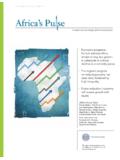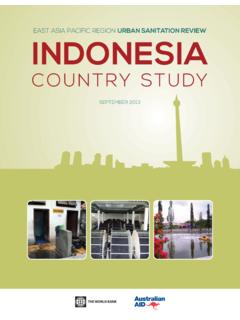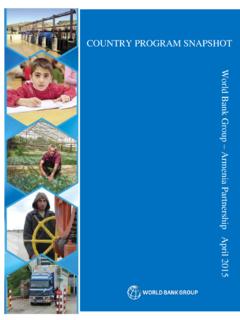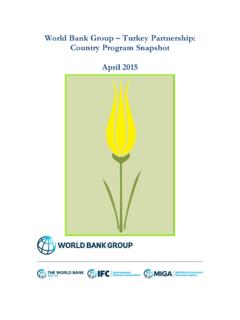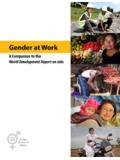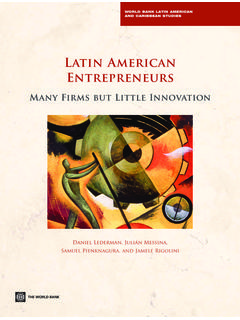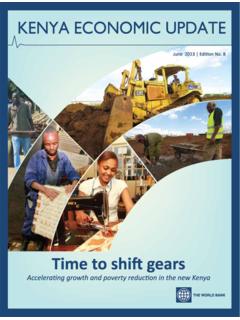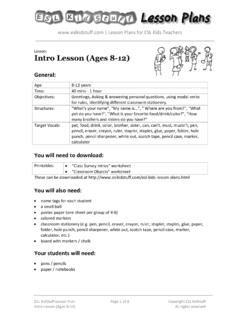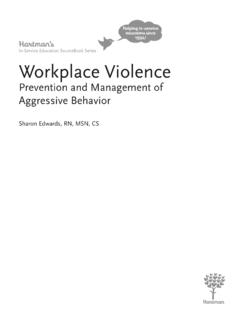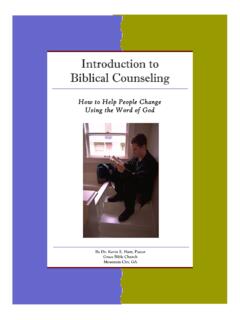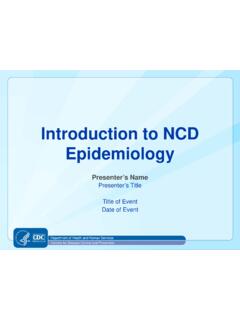Transcription of Life Skills: What are they, Why do they matter, and How ...
1 [Life skills training] has helped us know how to talk to people. Liberia EPAG trainee from Doe CommunityLife Skills: What are they, Why do they matter, and How are they taught?What Are Life Skills?Life skills programs are designed to teach a broad set of social and behavioral skills also referred to as soft or non-cognitive skills that enable individuals to deal effectively with the demands of everyday life. Programs can build on any or all of the following skills: decision-making ( critical and creative thinking, and problem solving); community living ( effective communica-tion, resisting peer pressure, building healthy relationships, and conflict resolution); personal awareness and management (self-awareness, self-esteem, managing emotions, assertiveness, stress management, and sex-ual and reproductive health behaviors and attitudes).Life skills programs can empower and guide learners to think critically about how gender norms and human rights govern their interactions with oth-ers and affect their behaviors, which is a feature of the Adolescent Girls Initiative (AGI) skills can be particularly important during adolescence, which is filled with new feelings, physi-cal and emotional changes, excitement, questions, and difficult decisions.
2 It is also a time when the differences between young men and women become more pronounced and gender norms take a stronger hold in governing young people s aspirations and behaviors. As they move through adolescence, life skills can help young people overcome the challenges of growing up and improve the quality of their young adult lives. Unfortunately, not much is known about how malleable these skills are at different ages or if there are important differences across the sexes. However, it is generally acknowledged that these skills can be augmented at least up until the end of the teenage years1, and that they are important for both young men and skills programs move beyond providing information. Although it is important to deliver information and to reinforce such knowledge peri-odically, this alone is rarely enough to motivate people to change behavior. Life skills programs aim to develop young peoples abilities and motiva-tions to make use of all types of information.
3 The approach should be interactive, using role plays, games, puzzles, group discussions, and a variety of other teaching techniques to keep the participant wholly involved in the Do Life Skills Matter?LIFE SKILLS MATTER FOR HEALTH OUTCOMESE conometric analysis shows that non-cognitive abilities ( self-control, sociability, and so forth) explain a variety of correlated risky behaviors and outcomes such as teenage pregnancy and marriage, drug use, and participation in illegal The public health literature finds that young people with gender equitable attitudes have better sexual health outcomes than their peers, and the converse is also true. For example, young people who believe that males should be tough and more powerful than females are less likely to use condoms or contra-ception, more likely to have multiple sex partners, LEARNING FROM PRACTICE SERIES | JUN 20132 AGI | LEARNING FROM PRACTICE more likely to be in intimate relationships that involve SKILLS MATTER FOR EDUCATION AND LABOR MARKET OUTCOMESE conometric and psychology studies in developed countries suggest that non-cognitive skills can affect both education and labor market outcomes in developed ,5,6,7 However, much less is known about how to develop these skills and about the impacts of comprehensive (vocational/technical and life skill)
4 Training interventions to improve youth employability and human capital were first intro -duced in developing countries in the early to mid-1990s with the J venes programs in Chile, Venezuela, Argentina, Paraguay, and Peru, and later replicated throughout Latin America. Experience from these youth training programs suggests that life skills are a key complement to increase the effectiveness of vocational There have been a number of rigorous evaluations of comprehensive interventions, however the evaluation designs have focused on measuring the impact of the total program pack-age on non-cognitive, behavioral, and employment outcomes, rather than the stand-alone impact of the life skills ,10,11 The Jordan AGI measured the direct impact of training in a sub-set of life skills focused on employability among community college graduates (see Table 1 for more program details).
5 A rigorous impact evaluation of the intervention found that the life skills training had no average impact on employment (1 year later), although there is a weakly significant impact outside the capital The life skills training did improve positive thinking and mental health among the beneficiaries. It is not known why the life skills training did not work in Jordan, although it is thought that structural issues in the labor market interfered with the effectiveness of the research is needed to understand both the direct and indirect effects of life skills programs. Life skills programs might matter on their own, and they may have an interaction effect for vocational/technical skill training programs to be effective. This evidence is particularly important for policymaking given that life skills programs can be implemented for approximately one-half to one-third of the cost of a full vocational More research is also needed to understand the mechanisms through which life skills training can improve youth labor outcomes and to improve the instruments used to measure such Does the AGI Teach Life Skills?
6 There are many different models for implementing life skills programs whether formally through schools, informally through community organiza-tions, or as in the AGI in the context of a program designed for another purpose ( , livelihoods, vocational training).15 Life skills programs or in the case of Lao PDR and Jordan, a subset of these skills focused on employability are incorporated into all of the AGI pilots. Typical duration of programs within AGI pilots is approximately 40 hours over the course of several months. For each of the AGI pilots, Table 1 summarizes (i) the key steps in the curriculum development; (ii) the training content; and (iii) the implementation This section synthesizes key lessons learned from the AGI pilots on how to design and implement a life skills Learned: Adapt life skills programs for local assessment of the community and the target audience should be conducted to help tailor the life skills program to specific local needs.
7 If a vulnerability study was conducted to inform the project design, this analysis can also help identify key issues to include in the life skills curriculum. Other organizations that may also be teaching life skills should be consulted to see if locally-adapted curriculums already exist. If not, international best practices can be drawn on to develop the program content, but then adapt sessions to make them more appropriate to the local This may entail translating the curriculum into local languages, changing names or situations in role plays, and add-ing or discarding certain modules. The curriculum may need to be updated on a regular basis to remain relevant. Remember to think carefully about the age and literacy levels of the beneficiaries. Curriculums I ve never taken a class like this before it is so useful now I know the real skills you need for life. Nepal AGI trainee from outside 1: Life Skills in the AGI PilotsDevelopmentContentImplementationHa iti Curriculum developed by the Bank task team based on international experience.
8 Informed by consultations with adolescent girls. Local consultant hired to adapt the curriculum. Vetted among Government Ministries. Psychosocial education Civic engagement and leadership Sex, gender and violence Sexual and reproductive health Preparing for work Reducing risks related to natural disasters Financial literacy Implemented by CBO s and technical training Curriculum developed by Business Development Center (BDC), a Jordanian NGO. Informed by consultations with employers. Effective communication and business writing skills Team-building and team work skills Time management Positive thinking Customer service CV and interview skills Implemented by BDC. 45 hours over a 9 day period (5 hours per day), with a maximum of 30 participants per group. Sessions held during daylight hours at locally known and trusted institutions such as the Chambers of Industry and local Curriculum developed by service providers with EPAG coordination team.
9 Informed by Girls Vulnerability Assessment conducted prior to project implementation. Adapted from several resources, both in-country and international. Preparing for the world of work Sexual and reproductive health Family skills Healthy living Preventing and responding to SGBV Communication, self-esteem, and leadership Know your rights Community service Implemented by EPAG service providers (a mix of Liberian and international NGOs). Classroom training phase runs for six months. Training tracks vary: 3 4 hours per day, 3 4 days per week. All classes held during daylight hours at training venues in communities where trainees Curriculum developed by the Centre for Development and Population Activities (CEDPA). Consultant hired to tailor the curriculum for the target group of the AGEI and field test with the T&E providers. Negotiation skills Dealing with discrimination Workers rights education Sexual and reproductive health Business development skills and financial management Classroom training is 40 hours over 5 days following the technical training.
10 The T&E providers subcontract specialized trainers to deliver the life skills training. Trainers trained via a training of trainers (ToT) model, with a refresher Sudan Curriculum developed by BRAC based on a similar AGI project in Uganda, and adapted to the South Sudan environment. Skills of making effective decisions Skills of knowing and living with others Skills of knowing and living with oneself Sexual and reproductive health (menstruation, early pregnancy, STI/HIV prevention, family planning, etc.) Leadership Gender and bride price Rape (meaning, prevention strategies, responding and coping) Course is conducted over 5 months (20 hourly sessions) within the Girls Club premises. Adolescent Girl Leaders trained by BRAC to deliver the life skills via a training of trainers (ToT) model, with a mid-way refresher PDR Local firm hired to provide certified training on counseling and soft skills to career counselors.

